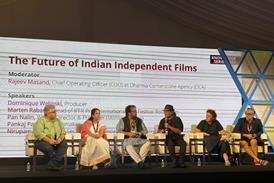Wedged somewhat gingerly in Motion Picture Association of American chairman Dan Glickman's address at the ShoWest convention last week was a discreet reference that opposed federal legislation intended to pave the way for 'net neutrality.'
His terse comments included a belief that equitable access to the Internet would 'impair the ability of broadband providers to address the serious and rampant piracy problems occurring over the networks.'
In a post-address press conference Glickman said that although the issue has not been a prime focus of the MPAA, he felt that ShoWest was an apt public forum to start a dialogue.
Last month a bipartisan bill (HR5353) was introduced in the U.S. House of Representatives once again advocating key net neutrality issues including the movement of data without regard to the service provider and more philosophically tilted issues of the net as a forum for discourse and creativity.
Two early bills were rejected in the House under Republican control. However, in the past two years public concerns about such issues as price fixing and content access have become more audible. Comcast recently admitted to 'throttling' (slowing bit stream feeds) subscriber access on the pretext of network management.
The day prior to Glickman's speech, Federal Communications Commission chairman Kevin Martin said in an address to the Stanford Law School that the FCC was 'ready to take action' against broadband provides that interfere with consumers' Internet access in a discriminatory way.
Jean Prewitt, president of the Independent Film & Television Alliance, promptly responded to Glickman stressing that in the wake of industry consolidation in traditional media arenas 'the Internet offers the only truly open opportunity to reach consumers.' The issue, per Prewitt, 'is not whether government should regulate the Internet but whether there will be effective oversight to prevent a handful of corporate giants from imposing their own version of private regulations to the public's detriment.'
Prewitt told Screen that the issue is likely to come to a boil in the next four to six months with the government planning public hearings dubbed 'broadband summits' in eight U.S. centers and a conference on media reform slated for early June in Minneapolis. 'There are a lot of legitimate issues that concern people on both sides of the issue. But I don't see a swift resolution. The bills include technical issues mushed together with philosophical concerns and it's tough to combine them without doing serious violence to the principles.'
Martin attempted to balance the two realms at Stanford calling the situation with network management 'critical' in the way it affects consumers and businesses in America and in the message it sends the international community about the country's commitment to ensuring that the Internet remains a tool for democracy.





















No comments yet